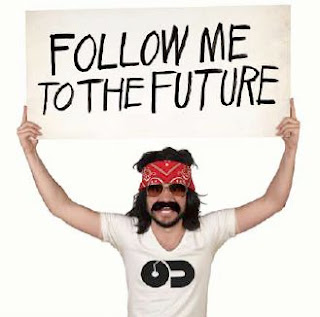
Will Tweet For Food
There’s a revolution coming, people. Not the “We’d like to sell you some mutual funds by incorporating music that used to be subersive into our otherwise non-threatening and highly establishment-based television ad” kind of revolution. Not the kind that requires a lot of marching with torches, either (which is good, because it’s been a wet summer, making serviceably dry torch wood difficult to find, and quite frankly, I’m just a little too bushed to be marching about prattling on about brotherhood and equality while singing full-throated anthems and such). No, not that one either; that happened, it was fun, and we all got nice t-shirts out of it.
Not to go all Tracy Chapman on you, but I’m talking ’bout a revolution that sounds like a twitter.
The new media, and in particular Twitter, is going to change the way that large organizations communicate with individuals. It’s going to have serious implications for the way teams like the Maple Leafs – and their players – relate to the fans.
In and around the free agency period, for example, I had a feeling that Brian Burke would be signing Francois Beauchemin. Incidentally, it is entirely possible that I picked up on that idea at least somewhat by reading Leafs-related chatter on Twitter, I don’t know; I can’t say for sure. In any event, though, using the excellent interface TweetDeck (basically a supercharged Twitter client/browser that allows you to open multiple Twitter streams at once), I kept tabs on a number of potential Leaf-related developments by opening columns designed to stream tweets containing certain words. One of these was a search for “beauchemin“. The columns continually updated as people from all over sent out their thoughts and information concerning the big defenceman. For a day or two, much of the chatter was simply conjecture about the possibility of Happy Trails signing with this or that NHL team; there came a point, though, when the information being exchanged started strongly suggesting that he would imminently become a Leaf. The tweets began to fly fast and furious, and not very long after, I learned – via a 140 character (or less) tweet – that Beauchemin was coming to Toronto.
In seconds, I was “re-tweeting” the information to the folks who were following me, and watching the information disseminate further like concentric circles on a pond as my tweet alerted others on the network of the news. fascinating stuff, and a definite game changer when you consider that only 40 years ago, the interested consumer of this knowledge would have had to wait for the morning paper to arrive on his or her doorstep. Not long after that, Brian Burke was confirming the signing at a press conference. My point is that because of Twitter, there doesn’t need to be any newspaper or conventional news gathering organization involved in the dissemination of this information.
The implications for large organizations wishing to push their message out to the populace are stunningly obvious. Well, stunningly obvious that is, to every organization except MLSE, which has had certain well poorly documented problems in the past with Twitter. Quite apart from the “Brian Burke” fiasco though, MLSE has now apparently hired HAL 9000’s autistic cousin to robo-tweet, in hyper-annoying fashion, the same repetitive and dated messages over and over again to the increasingly exasperated masses. This is the approximate digital equivalent, in old media terms, of sending Mr. Whipple to your house to berate you for squeezing the Charmin, pee on your floor and punch your dog in the face.
It’s probably safe to assume, then, that the suits at MLSE aren’t exactly ahead of the curve on integrating a medium like this into the daily life of the team, and it remains to be seen how the team will handle it once that robot is given a proper sendoff.
Even more interesting will be watching teams like the Leafs deal – or attempt to do so – with the players in the locker room tweeting away, communicating directly with fans via a service like this. This is an issue that the Leafs will have to deal with this year, as Mike Komisarek is a Twitter user. Komikazi tweeted tonight that he had received some good medical news and expected his shoulder to be fully recovered in time to begin training camp. Reading this tweet left me with a sense of some connection, some almost direct connection with the player. I didn’t read a quote from Komisarek about his shoulder that had been chosen by a newspaper writer who had decided to write about the subject; Komi told me, matter of fact. It’s the next best thing to him calling up and leaving a message on my voicemail.
I wonder, though, whether there will be a struggle to come between management and players about the use of a service like this. MLSE is an organization that labours mightily to try and maintain control over the message being disseminated about the Maple Leaf brand, and it is an organization that is very well positioned to do so, having access to the video production and broadcast facilities of Leafs television, on-air talent on staff, etc. It remains to be seen how tolerant the NHL in general and Leaf management in particular will be about tweets emanating from the dressing room; I suspect that it won’t be long before a fun-killing directive or policy is developed on this. The potential for problems, or at least things that have in the past been perceived as problems, is enormous: consider a player warring with his coach tweeting from the locker room during an intermission, complaining to his fans about not getting icetime on the powerplay. Imagine the fans getting behind their disgruntled hero and chanting for him as the next period begins. Tensions between the coach and player go up as the coach has to decide whether to give the fans what they want or keep the player riding the pine.
Even in the absence of conflicts such as the above, the simple fact is that – as more and more players begin talking for themselves in this way – fans will become less and less likely to care what the “official” MLSE website, spokesperson or twitter feed says; why would we spend time digesting that content when we can get our information fix directly from the horse’s mouth? Perhaps more than any other single factor, this dynamic – driving interest to player accounts rather than team/organizational outlets – will provoke a reaction from NHL teams. These teams, after all, are in the entertainment business; sooner or later, they will realize that their audience is generating traffic that’s going “off campus” and by definition isn’t helping them sell tickets, sweaters and bobbleheads. Expect the “twitter” issue to be part of the next CBA negotiations.
It’ll be a shame for the fans when the orders do come down for players to cease and desist. In the meantime, imagine the fun of sitting in the seats at the ACC and getting updates on your mobile phone from one or more of the players in the locker room during an intermission: “Interview with HNIC a godsend; Kabby’s shinpads stink” or “Stajan just took a wad of tape in the face,” or “Holy crap, Wilson bitch-slapped Jamal Mayers. I am hiding in the shower.”


Meanwhile in the No Fun League …
I hadn’t seen that specific article, Mike – though I did read somewhere else about twelve NFL teams basically taking an anti-Twitter stance that restricts (or perhaps attempts to restrict) players and accredited media members from blogging, texting or tweeting during games and practices.
It’s stupid, of course, because the fans face no such restriction and any jarhead with an iPhone can joyfully tweet away about that which the reporters may not.
Thanks for the link; there have been some other developments on this issue this week at ESPN and with the U.S. Marines that I’m going to follow up on with an updated post, I hope.